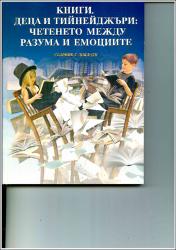| dc.identifier.citation | ALTAY Ahmet and , Y. ALKAN, “Creative Knowledge Services in The Public Libraries in Turkey Aiming to Gain Habit of Reading and Using Libraries for Children” Rositsa Petrova Vasileva (compiler) Children and Reading - Between Traditional and Electronic Books, Sava Dobroplodni Regional Library, Sliven, 2014, s. 195-203 (Bulgarca); 204-211 (İngilizce). (ISBN 978-61990081-7-1) | |
| dc.description.abstract | Reading, which is defined as a very important educational tool and language skill that plays a crucial role in gaining information and cultural knowledge for identifying the self, environment and the world as well as critical consciousness during which various cognitive calculations such as seeing, perceiving, attention, remembering, interpretation, explication, synthesis, and analysis are involved simultaneously (Coşkun, 2002) is an activity that exists and should exist in every step of life. Reading is a value that widens an individual’s world, forms the personality, and binds him/her to the others. Reading is a lifelong activity, and should be built into a habit. Apart from the benefits that reading offers to a person such as language, thinking, success, education, personality, sufficiency, and prestige; it also has a direct impact upon the level of development of the societies. From this point of view, it is not a coincidence that the countries that have the highest reading habit are also the most developed countries. Shortly, reading is one of the most important prerequisites and insurances of a well-developed personality in individual level; and an efficient economy, a democratic structure and a healthy community in social level (Yılmaz, 1993: 26). Acquisition of information has become an important achievement for individuals in private and societies in general in today’s information age in which information proceeds swiftly and cumulatively within a relentless race against time. In modern societies, the crucial thing is not only reaching the information, but using it efficiently and effectively as well. To use information, comprehending it correctly, explicating, and further, questioning correctness, benefits and necessity of this information are all required. Emergence and development of new ideas and information depends on questioning and criticizing the existing learned information, and replacing it with new ones. Reading has a vital place in the acquisition of all of these skills (Sadioğlu ve Bilgin, 2008, s.815). For an individual who has not developed a reading habit in the period of childhood, building this habit in the later stages of his/her life is very hard. Therefore, gaining the habit of reading in the period of childhood and youth is a crucial matter. Also, gaining this habit in the early stages of the life contributes greatly to identifying themselves better, developing an ideal self-respect, assimilate themselves with some heroes in books, and even deciding the best job for themselves. For a child who has a special interest in reading, it provides many benefits both in the short and the long run. One of the skills that children gain at the very beginning of their educational life is reading, and even it is the most important one. Nevertheless, right after equipping the child with the skill of reading, building the habit reading is a process that will change their lives, develop their personalities, and pose an unchangeable place in shaping the relationships and enriching their lives. Therefore, creation of a special love in children toward reading and directing them to reading in primary and elementary schools are fundamental. Three institutions pioneer in the process of gaining the habit of reading; family, school and library. In this study, public libraries which play an ultimately strategic role in building children’s reading habits next to family and school will be put under focus. Within this scope, the importance and active role of public libraries in the development of reading habit in children and youngsters will be emphasized. | |





















